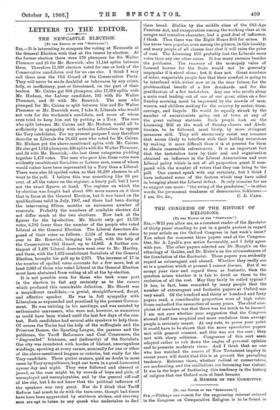THE CONGRESS OF THE HISTORY OF RELIGIONS.
[To THE EDITOR OF THE " SPROTATOR.1
Stn,—Will you allow me, as a constant reader of the Spectator of thirty years' standing, to put in a gentle protest in regard to your article on the Oxford Congress in last week's issue ? You select for comment three papers read at the Congress. One, Sir A. Lyall's, you notice favourably, and I fully agree with you. The other papers selected are Dr. Haupt's on the ethnology of Galilee, and Dr. Eisler's on the circumstances of the foundation of the Eucharist. These papers you evidently regard as extravagant and absurd. Whether they really are so is a question which at present I cannot discuss. But if we accept your view and regard them as fantastic, then the question arises whether it is fair to dwell on them to the exclusion of all the rest. May they fairly be called typical ? It has, in fact, been remarked by many people that the number of extravagant and fantastic papers at Oxford was very small. Of the hundred and thirty or hundred and forty papers read, a considerable proportion were of high value. Some embodied the researches of many years. The chief com- plaint of members was that there was too much to be learned. I am not sure whether your suggestion that the Congress showed itself less sceptical and more credulous than average people is seriously meant. At any rate, to prove your point it would have to be shown that the more speculative papers met with general consent, and this was not the case ; they met with sharp criticism. Congresses of this sort seem adapted rather to rub down the angles of personal opinion and to promote moderate views. And I think that no one who has watched the course of New Testament inquiry in recent years will doubt that this is at present the prevailing tendency. Extreme views, whether radical or conservative, are moderating, and the oscillations are becoming less violent. It was in the hope of furthering this tendency in the history of religion that one Oxford man at least became
A MEMBER. OF THE COMMITTEE.
























































 Previous page
Previous page